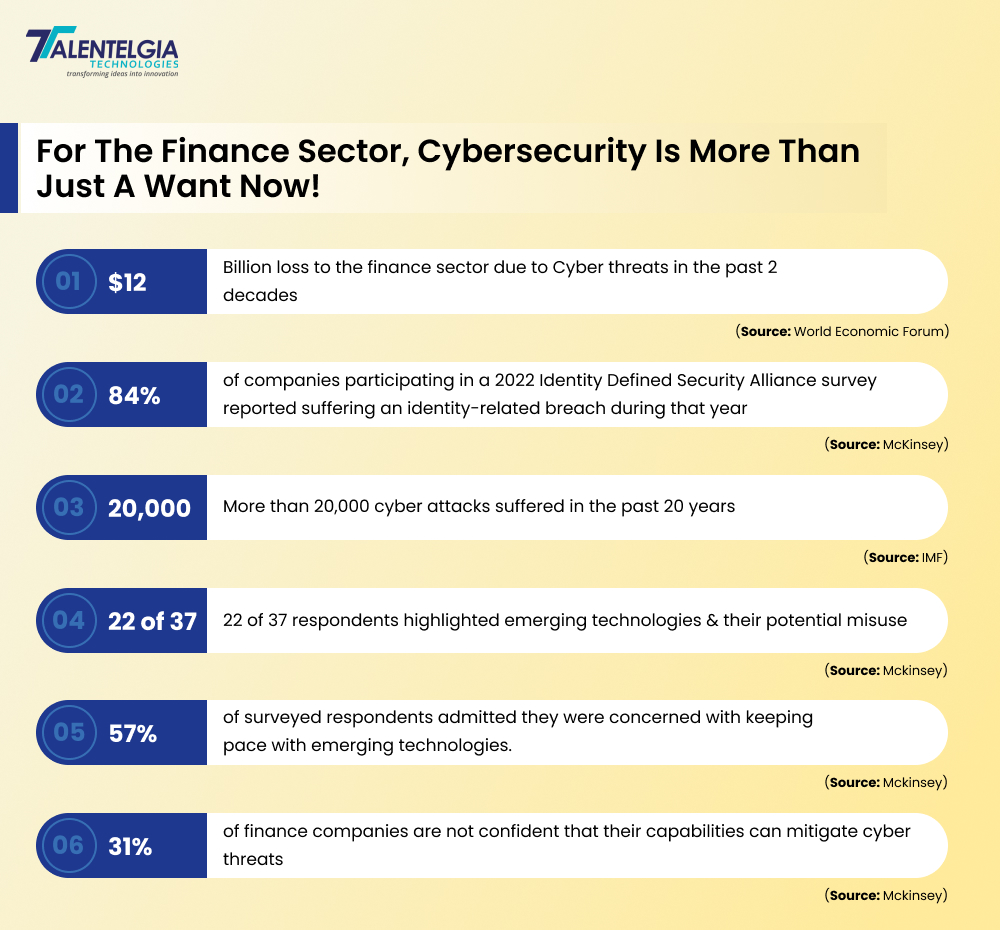The global finance industry has been experiencing rising cyber-attacks. For instance, as per the World Economic Forum, in the past two decades, almost one-fifth of reported cyber incidents have impacted the global financial sector, resulting in a loss of $12 billion. While the numbers might seem a bit impossible, the tendency of cyber attackers to be inclined toward the finance sector is not surprising. After all, the majority of cyber attacks are carried out for financial gains, thereby indicating an urgent need to integrate cybersecurity within the finance industry. In this blog, we’ll explore the role of cybersecurity in the financial industry, common cybersecurity threats faced by the industry, and key strategies to manage the cyber landscape.
Role Of Cyber Security Within The Finance Industry

The finance sector is continuously evolving. The introduction of emerging technologies like applied AI, web3, and cloud/edge computing has made the industry more efficient and innovative. It has also arrived with its own set of cyber risks which must be reduced using the current cybersecurity capabilities. Let’s understand the role that cybersecurity service provider plays in securing the finance sector:
Maintaining Transaction Integrity
Cyber Security plays a significant role in ensuring the authenticity of financial transactions. With huge amounts of sensitive data being processed regularly, this becomes a need rather than a want. Features like encryption, real-time monitoring, regular audits, and incident response systems can enhance the authenticity and integrity of the transaction at hand.
Awareness Regarding Emerging Threats
Given the recent advancements in the kind of cyber-attacks being carried out, financial institutions need to adopt the latest cybersecurity technologies like cloud security solutions and blockchain. This will not only ensure an effective security infrastructure at present but will also prepare the organizations for any unforeseen attack.
Maintaining Customer Trust
With millions of individuals putting their trust in the financial sector, it becomes imperative to ensure that the business-client relationship is maintained with sincerity. When individuals and businesses choose to trust financial institutions with their money, they need to be given the assurance that their data and money will be safe and secure. Effective cybersecurity can enhance client interaction thereby generating additional revenue streams.
Common Cybersecurity risks to the financial sector
With the cyber landscape continually evolving, new techniques are being used by attackers to target organizations. However, a few risks have emerged that are consistent across the globe. Let’s analyze these scenarios:
Insider Threats
An insider threat refers to a cyber threat originating from inside the organization, usually involving employees or business associates. It usually poses a major risk because the individual involved is more aware of the company’s data as compared to an external threat.
For instance, according to IBM, data breaches carried out by insiders ended up being the most costly at around USD 4.99 Million. This calls for appropriate cybersecurity measures like user behavior analytics and regular security training programs.
Data Breaches
Data breaches usually happen when unauthorized people get access to sensitive company data. While poor security protocol is a major reason for this, other factors like insufficient employee training can also lead to cyber-attacks. This not only results in financial losses but also reputational harm.
According to ABA Banking Journal, the approximate cost of a data breach in the financial industry in 2023 was $6.08 million, which is a 3% increase from 2023. When it comes to financial institutions like banks, breaches can result in consequences like financial losses and legal actions.
Distributed Denial of Service Attack
DDoS attacks are usually performed to disrupt the normal functioning of a particular targeted network by flooding it with unnecessary traffic. Usually, more than one device is used to generate illegitimate traffic and flood the target website by the same. Cyber security can combat DDoS attacks by making use of traffic filtering systems. Let’s take a quick look at the intensity of DDoS attacks to better understand the need for cybersecurity in the finance sector.
According to Hacker News, the number of DDoS attacks in 2024 increased by 465 when compared to 2023.
Malware
Malware is harmful software intended to infiltrate systems and devices. The program can take the shape of a virus, trojan, adware, and others to corrupt the normal functioning of a targeted device. Malware in the financial industry can hamper client credentials and even financial transactions.
According to stationx.net, almost 81% of organizations faced some form of malware attack in 2023. Deploying appropriate cyber security mechanisms can reduce the extent of malware attacks to a large extent, if not completely.
Key Strategies for Cyber Security
The current cyber landscape demands a proactive approach to ensuring that the risk assessment is conducted appropriately. To ensure the overall security of an organization’s data. Here are a few tips to ensure the same:
Multi-Factor Authentication
MFA is a cybersecurity measure that requires a user to submit two or more verification types. This is done to access a particular system. This is particularly helpful as usernames and passwords can be easily stolen by brute force attacks. Whereas MFA ensures enhanced data security and reduces the probability of a cyber attack. While the most commonly used MFA is OTP and biometric, other forms include hardware tokens, etc. For instance, MFA systems like Cisco Duo offer varied authentication mechanisms like tokens and passcodes.
Software Updates
Continually updating software ensures system integrity and reduces the probability of cyber threats. Not only this, updated software provides a hassle-free user experience by introducing new features and applications. Regular software updates usually include interface enhancement and the addition of features that help to operate the system smoothly.
Data Encryption
Data Encryption is a cybersecurity technique that can convert sensitive data into unreadable text. The data can then be decrypted using the correct decryption keys. This ensures data security both at rest and in transit. However, effective data encryption depends on proper maintenance of encryption keys, as the overall data security depends on them. For instance, google cloud platform uses encryption to protect data from being compromised.
Also Read: Cybersecurity Companies In India
Future Of Cybersecurity In the Financial Market
As the financial sector continues to evolve, the integration of cybersecurity as a major part of the industry will take place at a much faster pace. Let’s dive into some anticipated projected trends that are most likely to shape the scope of cybersecurity in the financial industry.
Zero Trust Security Models
A zero-trust security model operates on the principle of, “ 0 trust & 100% verification”. This basically means that no user, whether inside or outside the organization, should be trusted when it comes to data security. This is usually done by adopting techniques like micro segmentations and continuous monitoring and response plans.
Effective Collaboration
With rising incidents of cyber-attacks across the globe, it is important to create an effective information network. This will strengthen data security and ensure that the intensity of cyber threats is reduced. Organizations can also collaborate with government organizations that are more alert and possess access to a larger information base.
Investing in Cybersecurity Training
Financial Institutions can invest in appropriate cyber security training to make their employees aware of evolving cyber threats. This can be done by preparing cybersecurity modules or having an expert session on maintaining a security-first environment.
For The Finance Sector, Cybersecurity Is More Than Just A Want Now!
At a time when cyber threats are becoming a norm, financial institutions are almost regularly becoming prone to cyber threats including insider threats and DDoS attacks. Regular monitoring and strong security protocols are therefore becoming the need of the hour. This can easily be done by adopting strategies like multi-factor authentication, regular software updates, and others. Additionally, when we talk about business client relationships in the finance industry, the foundation is based on the trust and authenticity of the institution and its data security measures. This in turn must also motivate institutions to adopt proper data handling solutions which will serve the rapidly evolving nature of cyber threats.


 Healthcare App Development Services
Healthcare App Development Services
 Real Estate Web Development Services
Real Estate Web Development Services
 E-Commerce App Development Services
E-Commerce App Development Services E-Commerce Web Development Services
E-Commerce Web Development Services Blockchain E-commerce Development Company
Blockchain E-commerce Development Company
 Fintech App Development Services
Fintech App Development Services Fintech Web Development
Fintech Web Development Blockchain Fintech Development Company
Blockchain Fintech Development Company
 E-Learning App Development Services
E-Learning App Development Services
 Restaurant App Development Company
Restaurant App Development Company
 Mobile Game Development Company
Mobile Game Development Company
 Travel App Development Company
Travel App Development Company
 Automotive Web Design
Automotive Web Design
 AI Traffic Management System
AI Traffic Management System
 AI Inventory Management Software
AI Inventory Management Software
 AI Software Development
AI Software Development  AI Development Company
AI Development Company  AI App Development Services
AI App Development Services  ChatGPT integration services
ChatGPT integration services  AI Integration Services
AI Integration Services  Generative AI Development Services
Generative AI Development Services  Natural Language Processing Company
Natural Language Processing Company Machine Learning Development
Machine Learning Development  Machine learning consulting services
Machine learning consulting services  Blockchain Development
Blockchain Development  Blockchain Software Development
Blockchain Software Development  Smart Contract Development Company
Smart Contract Development Company  NFT Marketplace Development Services
NFT Marketplace Development Services  Asset Tokenization Company
Asset Tokenization Company DeFi Wallet Development Company
DeFi Wallet Development Company Mobile App Development
Mobile App Development  IOS App Development
IOS App Development  Android App Development
Android App Development  Cross-Platform App Development
Cross-Platform App Development  Augmented Reality (AR) App Development
Augmented Reality (AR) App Development  Virtual Reality (VR) App Development
Virtual Reality (VR) App Development  Web App Development
Web App Development  SaaS App Development
SaaS App Development Flutter
Flutter  React Native
React Native  Swift (IOS)
Swift (IOS)  Kotlin (Android)
Kotlin (Android)  Mean Stack Development
Mean Stack Development  AngularJS Development
AngularJS Development  MongoDB Development
MongoDB Development  Nodejs Development
Nodejs Development  Database Development
Database Development Ruby on Rails Development
Ruby on Rails Development Expressjs Development
Expressjs Development  Full Stack Development
Full Stack Development  Web Development Services
Web Development Services  Laravel Development
Laravel Development  LAMP Development
LAMP Development  Custom PHP Development
Custom PHP Development  .Net Development
.Net Development  User Experience Design Services
User Experience Design Services  User Interface Design Services
User Interface Design Services  Automated Testing
Automated Testing  Manual Testing
Manual Testing  Digital Marketing Services
Digital Marketing Services 
 Ride-Sharing And Taxi Services
Ride-Sharing And Taxi Services Food Delivery Services
Food Delivery Services Grocery Delivery Services
Grocery Delivery Services Transportation And Logistics
Transportation And Logistics Car Wash App
Car Wash App Home Services App
Home Services App ERP Development Services
ERP Development Services CMS Development Services
CMS Development Services LMS Development
LMS Development CRM Development
CRM Development DevOps Development Services
DevOps Development Services AI Business Solutions
AI Business Solutions AI Cloud Solutions
AI Cloud Solutions AI Chatbot Development
AI Chatbot Development API Development
API Development Blockchain Product Development
Blockchain Product Development Cryptocurrency Wallet Development
Cryptocurrency Wallet Development About Talentelgia
About Talentelgia  Our Team
Our Team  Our Culture
Our Culture 
 Healthcare App Development Services
Healthcare App Development Services Real Estate Web Development Services
Real Estate Web Development Services E-Commerce App Development Services
E-Commerce App Development Services E-Commerce Web Development Services
E-Commerce Web Development Services Blockchain E-commerce
Development Company
Blockchain E-commerce
Development Company Fintech App Development Services
Fintech App Development Services Finance Web Development
Finance Web Development Blockchain Fintech
Development Company
Blockchain Fintech
Development Company E-Learning App Development Services
E-Learning App Development Services Restaurant App Development Company
Restaurant App Development Company Mobile Game Development Company
Mobile Game Development Company Travel App Development Company
Travel App Development Company Automotive Web Design
Automotive Web Design AI Traffic Management System
AI Traffic Management System AI Inventory Management Software
AI Inventory Management Software AI Software Development
AI Software Development AI Development Company
AI Development Company ChatGPT integration services
ChatGPT integration services AI Integration Services
AI Integration Services Machine Learning Development
Machine Learning Development Machine learning consulting services
Machine learning consulting services Blockchain Development
Blockchain Development Blockchain Software Development
Blockchain Software Development Smart contract development company
Smart contract development company NFT marketplace development services
NFT marketplace development services IOS App Development
IOS App Development Android App Development
Android App Development Cross-Platform App Development
Cross-Platform App Development Augmented Reality (AR) App
Development
Augmented Reality (AR) App
Development Virtual Reality (VR) App Development
Virtual Reality (VR) App Development Web App Development
Web App Development Flutter
Flutter React
Native
React
Native Swift
(IOS)
Swift
(IOS) Kotlin (Android)
Kotlin (Android) MEAN Stack Development
MEAN Stack Development AngularJS Development
AngularJS Development MongoDB Development
MongoDB Development Nodejs Development
Nodejs Development Database development services
Database development services Ruby on Rails Development services
Ruby on Rails Development services Expressjs Development
Expressjs Development Full Stack Development
Full Stack Development Web Development Services
Web Development Services Laravel Development
Laravel Development LAMP
Development
LAMP
Development Custom PHP Development
Custom PHP Development User Experience Design Services
User Experience Design Services User Interface Design Services
User Interface Design Services Automated Testing
Automated Testing Manual
Testing
Manual
Testing About Talentelgia
About Talentelgia Our Team
Our Team Our Culture
Our Culture















 Write us on:
Write us on:  Business queries:
Business queries:  HR:
HR: 




